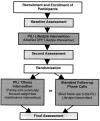Partnerships to address obesity disparities in Hawai'i: the PILI 'Ohana Project
- PMID: 18853898
- PMCID: PMC2585997
Partnerships to address obesity disparities in Hawai'i: the PILI 'Ohana Project
Abstract
Community-based participatory research (CBPR) is an approach to scientific research that is gaining broader application to address persistent problems in health care disparities and other hypothesis-driven research. However, information on how to form CBPR community-academic partnerships and how to best involve community partners in scientific research is not well-defined. The purpose of this paper is to share the experience of the Partnership for Improving Lifestyle Interventions (PILl) 'Ohana Project in forming a co-equal CBPR community-academic partnership that involved 5 different community partners in a scientific research study to address obesity disparities in Native Hawaiians and other Pacific Peoples (i.e., Samoans, Chuukese, and Filipinos). Specifically, the paper discusses (1) the formation of our community-academic partnership including identification of the research topic; (2) the development of the CBPR infrastructure to foster a sustainable co-equal research environment; and (3) the collaboration in designing a community-based and community-led intervention. The paper concludes with a brief summary of the authors' thoughts about CBPR partnerships from both the academic and community perspectives.
Figures
Similar articles
-
The PILI 'Ohana Project: a community-academic partnership to achieve metabolic health equity in Hawai'i.Hawaii J Med Public Health. 2014 Dec;73(12 Suppl 3):29-33. Hawaii J Med Public Health. 2014. PMID: 25535599 Free PMC article.
-
A Community-Based Participatory Research Guided Model for the Dissemination of Evidence-Based Interventions.Prog Community Health Partnersh. 2016;10(4):585-595. doi: 10.1353/cpr.2016.0067. Prog Community Health Partnersh. 2016. PMID: 28569684 Free PMC article.
-
Advancing Community-Based Participatory Research to Address Health Disparities in Hawai'i: Perspectives from Academic Researchers.Hawaii J Med Public Health. 2019 Mar;78(3):83-88. Hawaii J Med Public Health. 2019. PMID: 30854253 Free PMC article.
-
Culturally responsive approaches to health promotion for Native Hawaiians and Pacific Islanders.Ann Hum Biol. 2018 May;45(3):249-263. doi: 10.1080/03014460.2018.1465593. Epub 2018 May 29. Ann Hum Biol. 2018. PMID: 29843522 Free PMC article. Review.
-
Community-based participatory research (CBPR) approaches in vaccination promotion: a scoping review.Int J Equity Health. 2024 Nov 5;23(1):227. doi: 10.1186/s12939-024-02278-1. Int J Equity Health. 2024. PMID: 39501299 Free PMC article.
Cited by
-
Geographical maldistribution of native Hawaiian and other Pacific Islander physicians in Hawai'i.Hawaii J Med Public Health. 2012 Apr;71(4 Suppl 1):13-20. Hawaii J Med Public Health. 2012. PMID: 22737637 Free PMC article.
-
Medical school hotline: the Department of Native Hawaiian Health at the John A. Burns School of Medicine.Hawaii J Med Public Health. 2012 Nov;71(11):329-31. Hawaii J Med Public Health. 2012. PMID: 23155493 Free PMC article. No abstract available.
-
The PILI 'Ohana Project: a community-academic partnership to achieve metabolic health equity in Hawai'i.Hawaii J Med Public Health. 2014 Dec;73(12 Suppl 3):29-33. Hawaii J Med Public Health. 2014. PMID: 25535599 Free PMC article.
-
Community outreach and engagement strategies from the Wisconsin Study Center of the National Children's Study.Public Health Nurs. 2013 May;30(3):254-65. doi: 10.1111/phn.12018. Epub 2013 Jan 29. Public Health Nurs. 2013. PMID: 23586770 Free PMC article.
-
Outcomes from a diabetes self-management intervention for Native Hawaiians and Pacific People: Partners in Care.Ann Behav Med. 2013 Feb;45(1):24-32. doi: 10.1007/s12160-012-9422-1. Ann Behav Med. 2013. PMID: 23086589 Free PMC article. Clinical Trial.
References
-
- Minkler M, Wallerstein N. Introduction to community based participatory research. In: Minkler M, Wallerstein N, editors. Community Based Participatory Research for Health. John Wiley & Sons, Inc.; San Francisco, Calif: 2003. pp. 3–26.
-
- Viswanathan M, Ammerman A, Eng E, et al. Community-based participatory research: Assessing the evidence. Agency for Healthcare Research and Quality; Rockville (MD): Aug, 2004. (Evidence Report/Technology Assessment No. 99). Summary. AHRQ Pub: 04-E022-1. Contract No. Sponsored by RTI-University of North Carolina Evidence-based Practice Center. - PMC - PubMed
-
- Jones L, Wells K. Strategies for academic and clinician engagement in community-participatory partnered research. JAMA. 2007;297(4):407–410. - PubMed
-
- Tse AM, Palakiko DM. Participatory Research Manual for Community Partners. Island Heritage Publishing; Waipahu, HI: 2006.
-
- Israel BA, Schulz AJ, Parker EA, Becker AB. Review of community-based research: Assessing partnership approaches to improve public health. Annu Rev Public Health. 1998;19:173–202. - PubMed
Publication types
MeSH terms
Grants and funding
LinkOut - more resources
Full Text Sources
Medical


